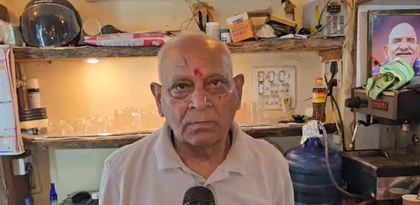GST exemption implemented, Varanasi locals celebrate 'Savings Festival'
By IANS | Updated: September 22, 2025 14:55 IST2025-09-22T14:51:13+5:302025-09-22T14:55:05+5:30
Varanasi, Sep 22 The new GST slab exemption announced by Prime Minister Narendra Modi has officially come into ...

GST exemption implemented, Varanasi locals celebrate 'Savings Festival'
Varanasi, Sep 22 The new GST slab exemption announced by Prime Minister Narendra Modi has officially come into effect from Monday, bringing visible relief to the citizens of his parliamentary constituency, Varanasi. Locals are celebrating the move as a 'Savings Festival,' marking a shift toward affordability and economic optimism.
From temple priests to restaurant owners and grocery shopkeepers, the sentiment is unanimous — this tax relief is a welcome gift, especially as it coincides with the beginning of Navratri.
“This decision will definitely boost business and offer direct benefits to consumers,” said Sheetala Prasad Upadhyay, a local restaurant owner. “Cheese, butter, pulses, rice — everything has become more affordable.”
Vinod Kannaujiya, who runs a general store, echoed the sentiment: “Reducing the GST is a great initiative. It’s a relief for common people and deserves to be celebrated as a ‘Savings Festival.’”
For Tulsi, a temple priest, the timing of the announcement is spiritually significant.
“On the first day of Navratri, this is great news. GST has been reduced on natural items used in puja rituals. This strengthens Sanatan Dharma. I thank PM Modi for this," he told IANS.
Citizens like Sunil Upadhyay view the change as a festive gift.
“From day one of Navratri, GST cuts will make daily essentials more affordable. This is a huge benefit for the common man.”
Meanwhile, India's revamped Goods and Services Tax system, dubbed next-generation GST or "GST Bachat Utsav", was implemented, reducing taxes on around 370 products, including daily essentials and lifesaving medicines.
Union Finance Minister Nirmala Sitharaman announced that the overhaul aims to inject approximately Rs 2 lakh crore into the economy by increasing the disposable income of consumers.
Over 50 items, including UHT milk, khakhras, pre-packaged paneer, and breads like chapatis and parathas, will now fall under a zero-tax bracket due to the new structure.
Thirty-three essential drugs and therapies for conditions including cancer and rare diseases are now exempt from GST, while the tax rate on numerous other medicines have been reduced from 12 per cent to zero. Medical devices, such as diagnostic kits and glucometers, now incur a GST of just 5 per cent.
The levy on stationery items for schools and offices, including erasers, pencils, notebooks, and maps, has been removed. Prices for several consumer staples have dropped, including butter, biscuits, condensed milk, namkeen, jams, ketchup, juices, dry fruits, ghee, ice cream, and sausages.
Dry fruits and nuts, including almonds, cashews, pistachios, and dates, will now be taxed at 5 per cent instead of 12 per cent.
Cement for housing is now set at 18 per cent, down from 28 per cent. Services such as haircuts, salon treatments, yoga classes, gyms, and health clubs will also see reduced rates.
Additionally, the zero-GST category now includes toiletries like soaps, shampoos, hair oil, face creams, and shaving cream.
GST on kitchen appliances and electronics, including air conditioners, televisions, washing machines, and dishwashers, has been reduced to 18 per cent from 28 per cent.
The government has merged cess into the GST base and imposed a 40 per cent levy on sin and luxury goods to offset revenue losses.
Cigarettes, bidis, pan masala, gutka, and other tobacco products are subject to the highest tax rate, along with aerated beverages such as Coca-Cola, Pepsi, and Fanta.
Disclaimer: This post has been auto-published from an agency feed without any modifications to the text and has not been reviewed by an editor
Open in app